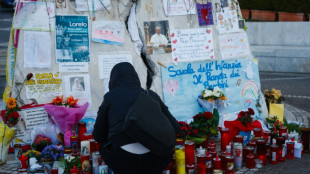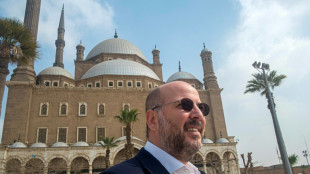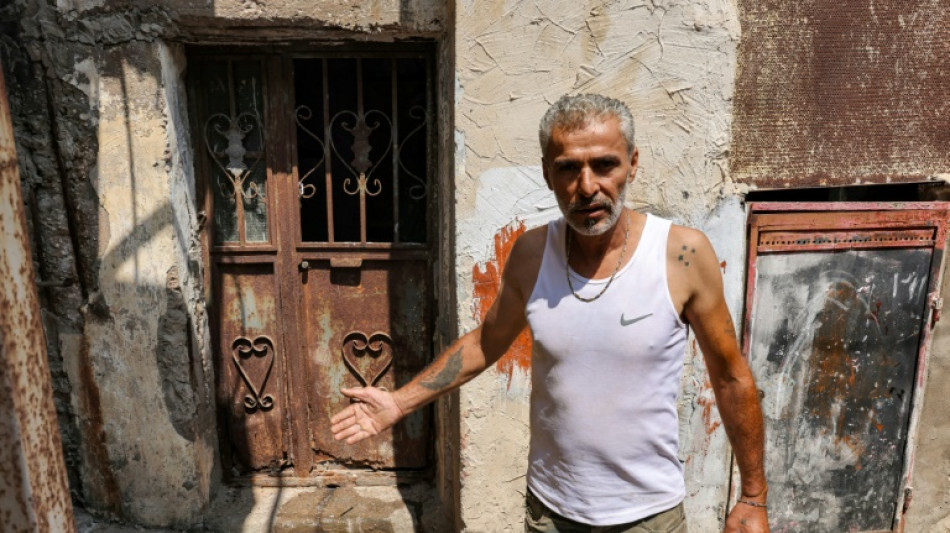
-
 Search ends for missing crew member after North Sea collision
Search ends for missing crew member after North Sea collision
-
One missing after cargo ship, tanker collide in North Sea

-
 Stock markets slump on US recession fears
Stock markets slump on US recession fears
-
'Elbows up!' - the hockey tactic inspiring Canada's anti-Trump fight

-
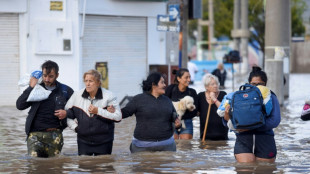 Argentina searches for baby, young sister swept away by floods
Argentina searches for baby, young sister swept away by floods
-
Stock markets slump on US economic fears

-
 UN chief says 'poison of patriarchy' is back with a vengeance
UN chief says 'poison of patriarchy' is back with a vengeance
-
UBS fined 75,000 euros in France for harassing two whistleblowers

-
 Stock markets slump on US, China economic fears
Stock markets slump on US, China economic fears
-
Major fuel shortage hits black gold producer Niger

-
 Musk spat renews opposition in Italy to Starlink deal
Musk spat renews opposition in Italy to Starlink deal
-
Stock markets mainly lower on China, US economy fears

-
 Former Ubisoft bosses on trial in France over alleged harassment
Former Ubisoft bosses on trial in France over alleged harassment
-
Strike action grounds thousands of flights in Germany

-
 Trump says US in talks with four groups over TikTok sale
Trump says US in talks with four groups over TikTok sale
-
Hong Kong, Shanghai lead losers on mixed day for markets

-
 'Got cash?' Tunisians grapple with new restrictions on cheques
'Got cash?' Tunisians grapple with new restrictions on cheques
-
Russian disinformation 'infects' AI chatbots, researchers warn

-
 'Quite sad': Renters turn to lottery in Spain's housing crisis
'Quite sad': Renters turn to lottery in Spain's housing crisis
-
Indonesians seek escape as anger rises over quality of life

-
 Iran says won't negotiate under 'intimidation' as Trump ramps up pressure
Iran says won't negotiate under 'intimidation' as Trump ramps up pressure
-
7-Eleven, Couche-Tard explore sell-offs ahead of potential merger

-
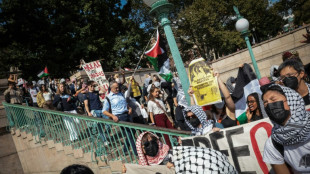 Trump admin detains pro-Palestinian campus protest leader
Trump admin detains pro-Palestinian campus protest leader
-
Japan auctions emergency rice reserves as prices soar

-
 Hong Kong, Shanghai lead losers on mixed day for Asian markets
Hong Kong, Shanghai lead losers on mixed day for Asian markets
-
China-US trade war heats up as Beijing's tariffs take effect

-
 7-Eleven to explore sell-offs with Couche-Tard ahead of potential merger
7-Eleven to explore sell-offs with Couche-Tard ahead of potential merger
-
Shareholders of Regeneron Pharmaceuticals, Inc. Should Contact Levi & Korsinsky Before March 10, 2025 to Discuss Your Rights - REGN

-
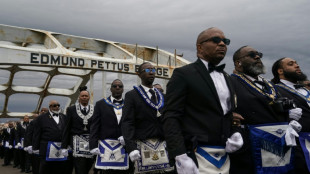 'So important': Selma marks 60 years since US civil rights march
'So important': Selma marks 60 years since US civil rights march
-
Black comedy from award-winning 'Parasite' director tops N.America box office

-
 EU chief sees US as 'allies' despite 'differences'
EU chief sees US as 'allies' despite 'differences'
-
French research groups urged to welcome scientists fleeing US

-
 Journalist quits broadcaster after comparing French actions in Algeria to Nazi massacre
Journalist quits broadcaster after comparing French actions in Algeria to Nazi massacre
-
Highlights from Paris Women's Fashion Week

-
 US ends waiver for Iraq to buy Iranian electricity
US ends waiver for Iraq to buy Iranian electricity
-
China-US trade war heats up with Beijing's tariffs to take effect

-
 Greenland's Inuits rediscover their national pride
Greenland's Inuits rediscover their national pride
-
Floods, mass power cuts as wild weather bashes eastern Australia
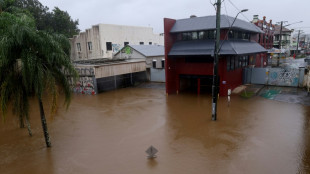
-
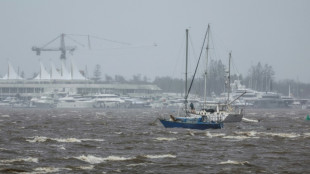 Wild weather leaves mass blackouts in Australia
Wild weather leaves mass blackouts in Australia
-
China consumption slump deepens as February prices drop

-
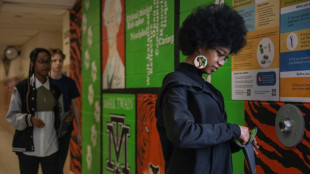 Phone bans sweep US schools despite skepticism
Phone bans sweep US schools despite skepticism
-
Some 200 detained after Istanbul Women's Day march: organisers

-
 'Grieving': US federal workers thrown into uncertain job market
'Grieving': US federal workers thrown into uncertain job market
-
Remains of murdered Indigenous woman found at Canada landfill

-
 Women will overthrow Iran's Islamic republic: Nobel laureate
Women will overthrow Iran's Islamic republic: Nobel laureate
-
Women step into the ring at west African wrestling tournament

-
 Trump's tariff rollback brings limited respite as new levies loom
Trump's tariff rollback brings limited respite as new levies loom
-
Hackman died of natural causes, a week after wife: medical examiner
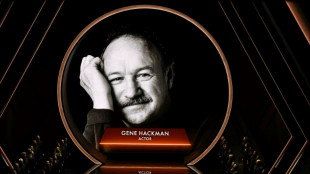
-
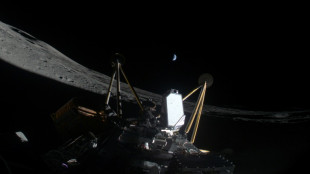 Oops, we tipped it again: Mission over for sideways US lander
Oops, we tipped it again: Mission over for sideways US lander
-
Cyclone Alfred downgraded to tropical low as it nears Australia


40 years on, survivors recall horror of Lebanon's Sabra and Shatila massacre
Forty years after Christian militiamen massacred Palestinian refugees and Lebanese nationals in the country's Sabra and Shatila refugee camps, the horrors of the tragedy remain seared into survivors' memories.
Najib al-Khatib, whose father and 10 other family members were killed in the massacre, still remembers the stench of corpses.
It "lingered for more than five or six months. A horrible smell," the 52-year-old Lebanese survivor said.
"They would spray chemicals every day, but the smell stayed," he told AFP from the Sabra camp for Palestinian refugees, where he lives with his family.
From September 16 to 18, 1982, Christian militiamen allied with Israel massacred between 800 and 2,000 Palestinians in the Sabra and Shatila camps on Beirut's outskirts. They also murdered at least 100 Lebanese and some Syrians.
Israeli troops, who had invaded in June that year as Lebanon's civil war raged, sealed off the camp while the militiamen went on their killing spree, targeting unarmed civilians.
Camp residents have been readying to mark the massacre's 40th anniversary on Friday.
"Until today, the smell is still in our heads -- the smell of the dead," Khatib said.
- 'Horses and corpses' -
Khatib walked down an alleyway in the impoverished Sabra camp where he witnessed the atrocities four decades earlier.
"This is my grandmother's house. During the massacre, it was full" of dead bodies, he recalled. "They were piled up here. Horses and corpses, all on top of each other."
"This area was full of people they killed," he said.
One of Khatib's most harrowing memories was finding his father's body at the door of his house.
"He was shot in his legs," he said. "They had hit him in the head with a hatchet."
Despite global outcry, no one has ever been arrested or put on trial for the massacre.
It came just days after the assassination of Lebanese president-elect Bashir Gemayel -- seen as a hero by many Lebanese Christians but hated by many in Lebanon for his cooperation with Israel.
In Israel, an inquiry found a number of officials, including then defence minister Ariel Sharon, were indirectly responsible.
It laid blame on Elie Hobeika, intelligence chief of the Lebanese Forces -- a right-wing Christian militia -- for the killings.
The LF, then allied to Israel, has maintained silence, never responding to the accusations.
A group of survivors tried to launch a lawsuit in Belgium against Sharon, but the court threw out the case in September 2003.
- 'Unimaginable' -
Umm Abbas, a Lebanese resident of Sabra who witnessed the massacre, recalled the "unimaginable scenes" that have gone unpunished.
"What did I see? A pregnant woman who had her baby ripped out of her stomach, they cut her in two," the 75-year-old said.
Another woman, "she was also pregnant, they ripped the baby from her stomach too", she said.
Sitting in an alley, Umm Abbas recalled bulldozers scooping up dead bodies and dumping them on top of each other.
"They put them all in a deep hole, I saw them," she said.
Survivors mark the massacre every year, some visiting the graveyard in Sabra where many of the victims were buried.
A simple stone memorial pays tribute to the "martyrs" of the massacre.
Palestinian Amer Okkar prayed at the site, where the makeshift graves still bear no tombstones.
"We found everyone slaughtered on the ground, in all the alleyways and along this street," the 59-year-old former militant remembered.
"We found pills and machetes and hashish and drugs on the ground -- no one could kill like that unless they were on drugs," he said.
P.Kolisnyk--CPN

